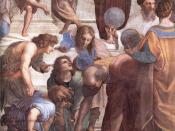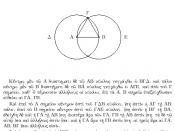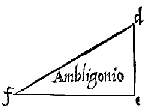[1] There is no royal road to geometry After the death of Archimedes, mathematical progress had stopped. Archimedes had developed mathematics to a point where no further advances could be made without the use of Algebra and analytic geometry. History would have to wait seventeen centuries for the next major step. Archimedes had pointed the way to calculus or analysis, but there was no one there to follow. The growing Roman Empire invaded Egypt, setting fire to ships in Alexandria. The fire to the ships spread to the library and burned half a million manuscripts-the repository of all ancient knowledge. What the flames missed, the Moslems looted seven centuries later, scattering the heritage of Greece to the four winds.
Lobatchevsky and Euclid both worked on a not so "self-evident" axiom that through a point in a given plan only one line can be drawn parallel to another line on the plane.
Euclid defined the axiom as one that could not be proved. Lobatchevsky many years later tried to prove this theory. He discovered a non-Euclidean geometry-"pangeometry" or "Imaginary geometry" which is not depicted on an ordinary flat plane of Euclid. Instead, it can be visualized on a psuedoshpere. Even though this new geometry was just as valid as Euclid's, early astronomers thought Euclid's theory more useful. Euclidean geometry was capable of describing everything from paths of heavenly bodies to the sizes and shapes of dust. Therefore, they thought if space is Euclidean it cannot be non-Euclidean. It wasn't till the nineteenth century that Newtonian Physics, which is based on a Euclidean interpretation of space, appeared to have many problems. Albert Einstein, more than half a century later, erected a new system based on non-Euclidean geometry. This new system became a much simpler one to follow than Newton's system. Unlike Euclid, Lobatchevsky received little respect and recognition during his life. Yet for over two thousand years, no one had ever questioned Euclid's geometry until Nicholas Lobatchevsky.


